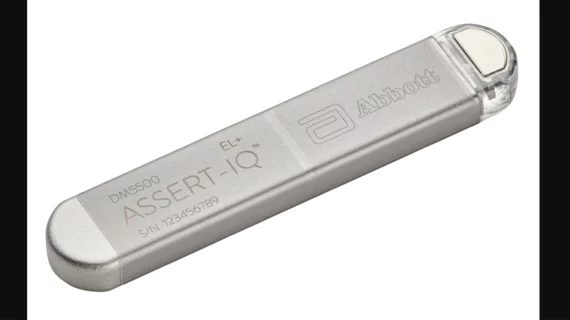Abbott’s new long-term ICM gains FDA approval
Abbott has received U.S. Food and Drug Administration (FDA) approval for its Assert-IQ insertable cardiac monitor (ICM). The device, designed for the long-term monitoring of arrhythmias, uses Bluetooth technology to provide real-time readings to a patient’s clinician every 20 seconds. It also provides physicians and users two battery options: a three-year battery for traditional cases or a six-year battery for patients who present with a history of heart treatments or an especially high arrhythmia risk.
“The Assert-IQ ICM is a significant advancement amongst the tools that are currently available for the diagnoses of irregular heart rhythms. Given that the device is small and is inserted just under the skin, patients can go about their daily lives, enjoying the activities they love, and the ICM does the work,” Dhanunjaya Lakkireddy, MD, medical director of the Kansas City Heart Rhythm Institute, said in a statement. “With Assert-IQ ICM's advanced algorithms, it can detect even hard-to-spot irregularities and help physicians determine a treatment course. It can be a very valuable tool both for short-term and long-term management of cardiac arrhythmia disorders.”
“As the incidence of abnormal heart rhythms like atrial fibrillation (AFib) continue to rise, more doctors are turning to ICM technology to monitor their patients remotely to better detect the cause of symptoms that can impact overall health and quality of life,” added Leonard Ganz, MD, divisional vice president of medical affairs and chief medical officer of Abbott's cardiac rhythm management business. “Until now, ICMs have allowed for remote monitoring of patients but lacked the longevity needed to monitor them long-term. Abbott's Assert-IQ ICM offers physicians a connected health device that will help them provide the best care for their patients while making more accurate and informed treatment decisions.”
The Assert-IQ device was designed to treat patients with unexplained symptoms—dizziness, palpitations, chest pain, syncope and shortness of breath, for example—and those who are susceptible to developing AFib or other arrhythmias.
Additional details are available here.

